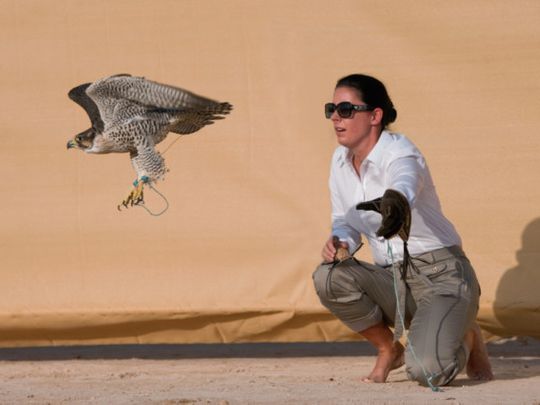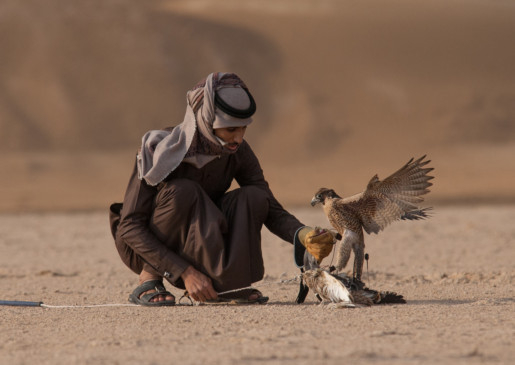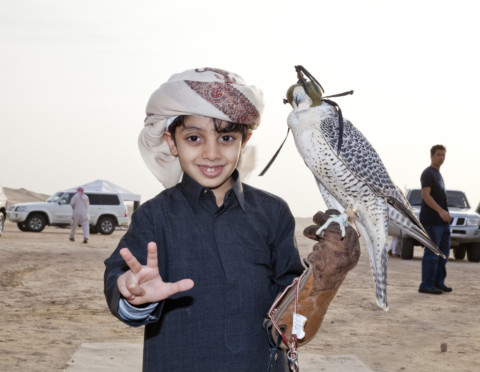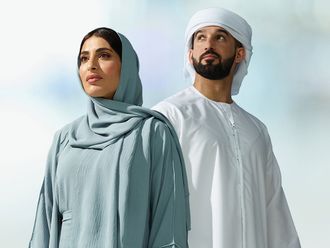
Dubai: One of the highlights at the Fazza Falconry championships held in Al Ruwayyah in Dubai this year was German national Dr Mariam Hampel, 41, the lone woman falconer standing tall among a sea of male counterparts and 124 competing birds of prey.
Crouching at the starting line, Dr Hampel deftly let her 10-month-old Gyrfalcon, Speedy, go. The grand Avian swept the bait in a flash establishing its quickest time of 23 seconds.
Private veterinarian to the falcons of His Highness Shaikh Mohammad Bin Rashid Al Maktoum, Prime Minister and Vice-President of the UAE and Ruler of Dubai, Dr Hampel found her true calling when she moved to the UAE 10 years ago. A lover of falcons, she returned to compete at the championships this year.
Falling in love with falconry
Dr Hampel’s tryst with falconry began nearly 12 years ago, when she came across an abandoned falcon in the desert. A bird lover and trained vet, she tended to the bird and quickly discovered her passion and enthusiasm for falcons.
“Falcons are my passion and it is always a privilege for me to compete alongside such experienced falconers. The falcons keep getting faster every year as their training improves and they adapt to the climate in the UAE,” she says.
Tending to falcons is no easy task as the birds are exotic and demand special attention points out Dr Hampel. “The bigger falcons are imported from Europe and it takes them a while to adapt to the climatic conditions here, thus making them more prone to illness,” she adds.
She prefers working with Gyr falcons as the first falcon she had was a Gyr. “I am quite comfortable with this breed. Speedy is a male and can be quite temperamental because he is young. The younger Gyr Falcons are usually small, but Speedy is a little bigger. Male Gyr Falcons are almost similar to the females. Sometimes, they can be faster. They come in a variety of colours, from black to brownish red.”
Dr Hempel shares her wealth of knowledge about these exotic birds of prey. “You have personalities among falcons too; the female Gyr Falcons, for instance, are very polite and respond well to their handlers, but the Shaheen Peregrine Falcons tend to get distracted. The best way to train falcons to hunt is to use small planes and balloons, to which some prey is attached. It comes down to the skill of the falconer and how well he is able to command his bird,” she says.
The conscientious trainer
Dr Hampel, who lives in Dubai, works diligently with Speedy each day and puts him to through a regular routine to achieve best results.
“I usually train Gyr in several different locations, so that he gets used to flying in different places. Otherwise, it can be a bit confusing for him if he is released in a completely new place.
“The best way to train a falcon — and the best way for me to train Speedy — is by using a small remote-controlled aeroplane with some bait attached to a string that is attached to the plane. Alternatively, we use small parachutes with bait attached at the end.
“The chute is released and the falcon has to go after the bait. These are the best ways to train them. I usually train Speedy once a day.” she says.
Dr Hampel is making sure she divides her time between her passion and job equally. “I am mostly involved in my duties as a vet through the year, but in between, I participate in the championships once a year and take occasional breaks to travel with people who share my passion for falcons. I feel very privileged to be in this position because I can pursue what I am most passionate about.”
Conserving a heritage sport
The best way to prepare for a championship and get acquainted with the sport of falconry is to accompany hunting expeditions into the desert. Dr Hampel recently travelled on one such expedition to Uzbekistan. “It is fascinating to watch and learn from falconers as they train their birds to hunt live prey and I enjoy being outdoors in their natural habitat, observing and learning from my comrades.”
She looks forward to continued participation in the championships and feels this is a fantastic platform to encourage young Emiratis to take to a sport that was practised by their forefathers. “I feel at home among these birds and it is such a privilege to be able to tend to them. I look forward to growing my knowledge and skill about falconry.
“Falconry is part of Emirati national heritage and it is great that it is being revived. The fact that the Fazza Championships have a category for juniors, which sees children as young as 5 and 6 years compete, shows the seriousness in promoting this sport.”
She urges all Emiratis to be a part of this sport wholeheartedly. “It is a part of their cultural heritage.”














